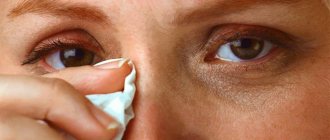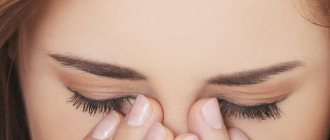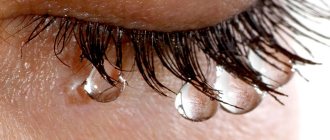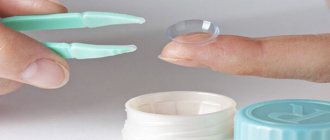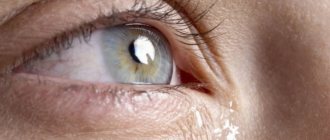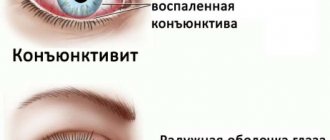Probable diseases
What diseases cause a runny nose and watery eyes? Most often, nasal congestion, sneezing and watery eyes occur against the background of an infectious lesion of the nasopharynx. The most common diseases leading to the appearance of pathological symptoms include:
- nasopharyngitis;
- allergic rhinitis;
- flu;
- cold;
- sinusitis;
- conjunctivitis;
- hay fever
You can definitely determine the cause of inflammation of the respiratory system after examination by an ENT doctor. Many people do not pay due attention to the process of treating colds, which causes the development of quite serious complications. It should be understood that the progression of the infection is fraught with damage not only to the throat and nose, but also to the paranasal sinuses.
Purulent inflammation of the airways can lead to the development of sinusitis, sphenoiditis, sinusitis and even rhinogenic brain abscess.
Provoking factors can contribute to the development of ARVI, which include:
- hypovitaminosis;
- exacerbation of chronic diseases;
- iron deficiency (anemia);
- hypothermia;
- allergies to food, pollen, medications;
- thermal and chemical burn of the nasopharyngeal mucosa;
- bad habits (smoking, alcohol abuse);
- abuse of antibacterial agents.
In the mucous membranes of the respiratory tract, the infection develops very quickly. That is why delayed treatment of a common cold can lead to dire consequences, including meningitis and pyelonephritis.
Causes of tearing
Why does my nose run and my eyes water?
Watery eyes with a runny nose can often develop with sinusitis.
This is an inflammatory process of the nasal septum, in which a large amount of mucus is released which flows from the nose in the form of snot, and additional symptoms of this disease are difficulty breathing, coughing, sneezing, and a constant feeling of nasal congestion.
Its volumes also increase due to the fact that such sputum is partially released through the lacrimal canals.
Runny nose, sneezing and watery eyes without fever
With sinusitis, most patients have a rise in body temperature, which is typical for any inflammatory diseases.
But this symptom may not appear if lacrimation occurs with allergic rhinitis (rhinitis).
Rhinitis appears against the background of bacterial or viral damage to the body. In this case, a runny nose acts only as a symptom, and not as an independent disease. The sooner you pay attention to the symptoms of inflammation, the easier it will be to treat it.
In addition, a runny nose can appear due to trauma to the nasal passages, as a result of long walks in the cold, due to improper or excessively frequent use of medications, especially vasoconstrictor drops.
Acute or exacerbation of chronic rhinitis. With these diseases, inflammation and swelling of the mucous membrane occurs. The swollen mucous membrane blocks the exit of the nasolacrimal duct, which is manifested by lacrimation and runny nose.
- sneezing without fever;
- irritating cough;
- dry mouth, etc.
A common cause of rhinitis and lacrimation in children is an allergic process.
The imperfection of the immune system forces it to react violently to many environmental stimuli.
New foods, unknown odors, pets, pollen and plants - all of these and more can cause the problem.
A specialist who will not only carefully collect anamnesis and examine the child, but will also conduct the necessary allergological tests will help you distinguish between a common runny nose or an allergy.
In fact, tearing of the eyes is a natural protective reaction of the body. The eyes are moisturized, which ensures:
- replenishment of the cornea,
- getting rid of pathogenic bacteria and dust particles.
Thanks to the lacrimal glands located in the corners of the eye sockets, fluid can flow to the eyeball and then be evenly distributed throughout it. The fluid accumulates in the inner recess of the eye slits, which is called the ocular lacrimal lake. After this, the tears enter the nasal cavity.
If tears flow for no apparent reason, and itching in the eyes does not go away, health problems should be suspected.
There are many reasons for lacrimation. The most common of them will be:
- active inflammation of the nasal mucosa, paranasal sinuses (sinusitis),
- inflammatory process caused by allergens (allergic rhinitis, expressed by hay fever or an allergic reaction to irritants),
- active inflammation of the eye membrane, provoked by viruses, infection, allergies (conjunctivitis).
Children and middle-aged people are especially susceptible to these diseases. Only a doctor can tell why problems appeared in the nose and eyes of a particular patient.
The main recommendation for those who have watery eyes and a runny nose is to try not to create excessive pressure in the nose. When blowing your nose, do not pinch both nostrils at once.
Otherwise, the infection from the nose will spread further, aggravating the situation.
Very often, patients are affected by sinusitis. The obvious symptoms of the disease are: swollen, stuffy nose, sneezing, coughing. When you have a runny nose, your eyes constantly water and your snot becomes clear. This symptom is accompanied by itching and pain in the nasopharynx and throat.
The internal pathological process is caused by drying out of the septum, causing abundant secretion of sputum and difficulty breathing. The nasal septum increases in size, blocking the entrance to the paranasal sinuses. As a result:
- the patient's general condition worsens,
- headaches, sneezing,
- suffer from discomfort in the cheekbones and eye sockets.
During acute respiratory viral infections or acute respiratory infections, the eyes become watery due to swelling of the nasolacrimal duct. If the nose is stuffy, all the exudate accumulated in the nasopharynx comes out through the lacrimal canal, which is unnatural.
Principles of treatment
How to treat if your eyes water when you have a runny nose? As already mentioned, lacrimation in most cases occurs due to inflammation of the nasolacrimal duct. With adequate treatment of inflammation in the nasopharynx, the outflow of tear fluid is normalized, thereby eliminating unwanted manifestations of the disease.
As a rule, treatment begins with taking medications that eliminate the direct cause of rhinitis - infection. For a cold, pathogenic flora in the nasopharynx can be destroyed using antiviral agents: Anaferon, Groprinosin, Ingavirin, Lavomax, Arbidol, etc. In addition, it is recommended to use symptomatic medications, which can stop coughing, sneezing, lacrimation and rhinitis.
You can speed up the process of clearing the respiratory tract from infection with the help of sanitizing procedures and inhalations. Irrigation of the nasopharynx with anti-edematous and wound-healing medications can quickly ease nasal breathing and reduce the severity of inflammation in the mucous membrane. In case of allergic damage to the ENT organs, it is possible to relieve the symptoms of the disease with the help of systemic and local antihistamines.
As a rule, treatment begins with taking medications that eliminate the direct cause of rhinitis - infection. For a cold, pathogenic flora in the nasopharynx can be destroyed using antiviral agents: Anaferon, Groprinosin, Ingavirin, Lavomax, Arbidol, etc.
In addition, it is recommended to use symptomatic medications, which can stop coughing, sneezing, lacrimation and rhinitis.
What should I do?
First of all, remember that when you have the flu, in most cases your eyes hurt precisely because of intoxication of the body. And for this pathological condition there is only one cure - time. After a few days, the body will be cleansed of decay products and all unpleasant sensations will disappear.
However, if a symptom of the flu bothers you very much, you should call a doctor home.
In all other cases, you need to follow simple recommendations:
- maintain bed rest;
- drink a lot of warm drinks;
- do not eat without appetite;
- ventilate the apartment twice a day;
- Rinse the nasal cavity daily with saline solution.
If you do this, then after a few days you will most likely feel relief and your eyes will stop hurting. Additionally, we recommend that you read the article “Eye pain during a cold.”
Antiallergic drugs
What should you do if your eyes water when you have a runny nose? The combination of symptoms often indicates the development of allergic rhinitis. If an irritating substance (allergen) penetrates the respiratory system, this leads to inflammation of the mucous membranes. It is worth noting that the patient’s general well-being is practically not affected - there is no temperature, body aches or sore throat.
Allergic rhinitis is not a harmless disease, since severe swelling of the nasal mucosa can lead to inflammation of the auditory tube and, as a consequence, the development of otitis media. If your eyes begin to water, and your nose begins to itch or burn, you should seek help from an immunologist or allergist. The following antihistamines can be used to relieve allergic manifestations:
- "Hifenadine";
- "Cetrin";
- "Loratadine";
- "Astemizole";
- "Trekhsol."
Modern antiallergic drugs affect the mechanisms of development of edema in the mucous membrane of the nasopharynx and nasolacrimal duct. Therefore, with timely use of medications, after a couple of days, patients’ rhinitis disappears and lacrimation stops.
What should you do if your eyes water when you have a runny nose? The combination of symptoms often indicates the development of allergic rhinitis. If an irritating substance (allergen) penetrates the respiratory system, this leads to inflammation of the mucous membranes. It is worth noting that the patient’s general well-being is practically not affected - there is no temperature, body aches or sore throat.
Features of sinusitis
Click to enlarge image
All of the above factors contribute to the development of sinusitis. Characteristic manifestations are nasal congestion, sneezing and coughing (not in all cases). The eyes begin to water, severe itching and discomfort appear in the throat area. Swelling of the septum occurs inside, which causes abundant mucus production and leads to difficulty breathing. After its increase, the entrance to the paranasal sinuses area is blocked. This leads to a deterioration in the patient’s general condition, the appearance of headaches and a feeling of constant discomfort in the area of the eye sockets and cheekbones.
The mucus that accumulates in the nutria cannot come out, which leads to pressure on the eye sockets and forehead area. The tear duct swells and all the fluid that accumulates inside begins to come out in an unnatural way.
Treatment measures
If your eyes are watery and a runny nose appears, you should not hesitate to visit a doctor. If the disease is started, a chronic form develops. In this case, the organs of vision may be seriously damaged.
The specialist will prescribe antibiotics in the form of drops (the active substance penicillin or cephalosporin), which also contribute to the expansion of vascular structures. Without fail, the specialist will prescribe remedies for the throat: medicinal herbal solutions or lozenges with a special spectrum of action. The duration of therapy depends on the form of the disease and the stage of progression of the inflammatory process.
Inhalation with a nebulizer
Aerosol inhalation is one of the most effective physiotherapeutic procedures, thanks to which it is possible to quickly eliminate almost all local manifestations of a cold - nasal congestion, sneezing, coughing, sore throat, etc. Unlike oral tablets, the aerosol penetrates directly into the lesions. Due to this, the concentration of antimicrobial, antiviral and anti-inflammatory substances quickly increases in inflamed tissues.
In order for the nose to stop stuffy, you need to eliminate inflammation and swelling in the mucous membrane. For these purposes, drugs with anti-edematous, immunostimulating, antibacterial and antiviral effects can be used:
- "Interferon";
- "Tonsilgon";
- "Chlorophyllipt";
- "Rotokan";
- "Furacilin".
To increase the effectiveness of nebulizer therapy, before inhalation it is recommended to drip vasoconstrictor drops into the nose - “Rinza”, “Galazolin”, “Naphthyzin”, etc.
Aerosol inhalation is one of the most effective physiotherapeutic procedures, thanks to which it is possible to quickly eliminate almost all local manifestations of a cold - nasal congestion, sneezing, coughing, sore throat, etc. Unlike oral tablets, the aerosol penetrates directly into the lesions. Due to this, the concentration of antimicrobial, antiviral and anti-inflammatory substances quickly increases in inflamed tissues.
To increase the effectiveness of nebulizer therapy, before inhalation it is recommended to drip vasoconstrictor drops into the nose - “Rinza”, “Galazolin”, “Naphthyzin”, etc.
What to do if your nose is itching?
Otolaryngologists or therapists can often hear patients complaining that they have an itching in their nose. Such a symptom is unlikely to be explained from a physiological point of view, and therefore requires elimination.
If you notice one or more symptoms, if your eyes are constantly watering or if you are bothered by an unreasonable runny nose, you should consult a doctor to select the right treatment tactics. This will help quickly solve the problem, preventing the condition from becoming chronic. Self-prescribing medications is not recommended. You should pay attention to the slightest changes in the body and be examined if there is a sharp deterioration in your health.
Undoubtedly, runny nose and sneezing are not fatal symptoms for which patients immediately seek help. However, if this happens regularly, this may indicate chronic diseases of the body, which, if left untreated, can progress more and more. Therefore, you should not constantly ignore such manifestations.
Sanitation of the nasopharynx
How to treat a stuffy nose and watery eyes? Nasal drops help eliminate inflammation in the nasal cavity, but they have virtually no effect on the condition of the mucous membrane in the paranasal sinuses. To ensure that mucus and infectious agents contained in it are washed out of the nasopharynx and paranasal sinuses, it is recommended to carry out sanitizing procedures.
Rinsing the nose with saline solutions helps normalize the outflow of intercellular fluid from the lesions. In addition, preparations based on sea salt have a beneficial effect on the condition of the mucous membrane, accelerate its regeneration and increase local immunity. Sanitation procedures are recommended for the development of a runny nose of any etiology. Anti-inflammatory and antiseptic agents destroy pathogenic agents in the ENT organs and thereby accelerate recovery.
To rinse the nasopharynx the following can be used:
- “Physiomer” is a solution based on sea salt, has an anti-edematous and wound-healing effect;
- "Quix" is a mucolytic agent that helps to liquefy and remove mucus from the paranasal sinuses and nasal passages;
- "Dolphin" is an isotonic solution based on sea salt, which accelerates the healing process of the nasopharyngeal mucosa.
Sanitation of the nose should be carried out at least 3-4 times a day during exacerbation of respiratory diseases. Regular rinsing of the nasopharynx and irrigation of the mucous membrane can eliminate a severe runny nose within a few days.
Causes of watery eyes during colds
The main reasons why the eyes water during a cold are diseases caused by hypothermia:
This is explained by the following fact: inflammation can spread to the nasal sinuses and the nasopharyngeal mucosa, as a result of which the nasal septum swells and the passages to the nasolacrimal ducts close.
A cold can also cause swelling of the tissues of the nasolacrimal passage itself. Due to the impossibility of normal drainage of fluid, it accumulates. Then the only way out is the tear duct.
The problem can be eliminated; it is enough to cure the underlying disease. It is also worth paying attention to the treatment of nasal congestion and associated diseases.
Causes and mechanisms
A feeling of itching or itching in the nose indicates irritation of the mucous membrane. The causes of such a reaction are foreign agents that enter the epithelium, in particular, microbes and allergens, dust, chemicals or strong odors. Therefore, the source of unpleasant symptoms may be hidden behind the following conditions and factors:
- Acute rhinitis.
- Vasomotor runny nose.
- Dusty and dry air.
- Use of vasoconstrictor drops.
The phenomenon of foreign bodies in the nasal passages cannot be ruled out, but this is mainly typical for children. In adults, one can also assume the consequences of injuries and operations when the mucous membrane has not yet completely healed, or a curvature of the nasal septum in the form of a spike, which constantly irritates the nasal wall.
